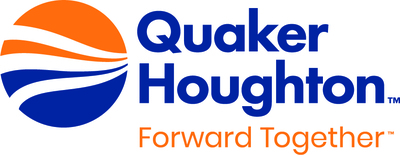CONSHOHOCKEN, Pa., Feb. 28, 2024 /PRNewswire/ -- The Board of Directors of Quaker Houghton (NYSE: KWR) today declared a quarterly cash dividend of $0.455 per share, payable on April 30, 2024, to shareholders of record at the close of business on April 16, 2024. In addition, the Board of Directors has approved a new share repurchase program authorizing the Company to repurchase up to an aggregate of $150 million of its common stock. The Company has terminated its prior 2015 share repurchase program.
Andy Tometich, Chief Executive Officer and President, commented, "We are excited by the long-term growth opportunities for Quaker Houghton and are committed to enhancing value for our shareholders. Our balanced capital allocation strategy remains, and we will maintain a disciplined approach to capital deployment with a priority towards our dividend and growth investments."
The Company is authorized to repurchase shares of common stock from time to time through various methods, including in open market transactions, block trades, accelerated share repurchases, privately negotiated transactions, derivative transactions or otherwise, certain of which may be made pursuant to a trading plan meeting the requirements of Rule 10b5-1 under the Securities Exchange Act of 1934, as amended, in compliance with applicable state and federal securities laws. The timing, as well as the number and value of shares repurchased under the program, will be determined by the Company at its discretion and will depend on a variety of factors, including our assessment of the intrinsic value of the Company's common stock, the market price of the Company's common stock, general market and economic conditions, available liquidity, compliance with the Company's debt and other agreements, applicable legal requirements, the nature of other investment opportunities available to the Company, and other considerations. The Company is not obligated to purchase any shares under the repurchase program, and the program may be suspended, modified, or discontinued at any time without prior notice. The Company expects to fund the repurchases by using cash on hand and expected free cash flow to be generated in the future.
Forward-Looking Statements
This press release contains "forward-looking statements" that fall under the safe harbor provisions of the Private Securities Litigation Reform Act of 1995 and the Securities Act of 1933, as amended. These statements can be identified by the fact that they do not relate strictly to historical or current facts. We have based these forward-looking statements on assumptions, projections and expectations about future events that we believe are reasonable based on currently available information,, including statements regarding the potential effects of the conflicts in Ukraine and the Middle East; inflation and global supply chain constraints on the Company's business, results of operations, and financial condition; our expectation that we will maintain sufficient liquidity and remain in compliance with the terms of the Company's credit facility; expectations about future demand and raw material costs; and statements regarding the impact of increased raw material costs and pricing initiatives. These forward-looking statements include statements with respect to our beliefs, plans, objectives, goals, expectations, anticipations, intentions, financial condition, results of operations, future performance, and business, which may differ materially from our actual results, including but not limited to the potential benefits of acquisitions and divestitures, the impacts on our business as a result of global supply chain constraints, and our current and future results and plans and statements that include the words "may," "could," "should," "would," "believe," "expect," "anticipate," "estimate," "intend," "outlook, "target", "possible", "potential", "plan" or similar expressions. A major risk is that demand for the Company's products and services is largely derived from the demand for its customers' products, which subjects the Company to uncertainties related to downturns in a customer's business and unanticipated customer production slowdowns and shutdowns, including as is currently being experienced by many automotive industry companies as a result of supply chain disruptions. Other major risks and uncertainties include, but are not limited to inflationary pressures, including the potential for continued significant increases in raw material costs; supply chain disruptions; customer financial instability; rising interest rates and the possibility of economic recession; economic and political disruptions, including the impacts of the military conflicts between Russia and Ukraine and between Israel and Hamas; tariffs, trade restrictions, and the economic and other sanctions imposed by other nations on Russia and/or other government organizations; suspensions of activities in Russia by many multinational companies and the potential expansion of military activity; foreign currency fluctuations; significant changes in applicable tax rates and regulations; future terrorist attacks and other acts of violence; the impacts of consolidation in our industry, including loss or consolidation of a major customer; and the potential occurrence of cyber-security breaches, cyber-security attacks and other security incidents. Furthermore, the Company is subject to the same business cycles as those experienced by our customers in the steel, automobile, aircraft, industrial equipment, aluminum and durable goods industries. Our forward-looking statements are subject to risks, uncertainties and assumptions about the Company and its operations that are subject to change based on various important factors, some of which are beyond our control. These risks, uncertainties, and possible inaccurate assumptions relevant to our business could cause our actual results to differ materially from expected and historical results. All forward-looking statements included in this press release, including expectations about business conditions during 2023 and future periods, are based upon information available to the Company as of the date of this press release, which may change. Therefore, we caution you not to place undue reliance on our forward-looking statements. For more information regarding these risks and uncertainties as well as certain additional risks that we face, refer to the Risk Factors section, which appears in Item 1A of our Annual Report on Form 10-K for the year ended December 31, 2022, and in subsequent reports filed from time to time with the Securities and Exchange Commission. We do not intend to, and we disclaim any duty or obligation to, update or revise any forward-looking statements to reflect new information or future events or for any other reason. This discussion is provided as permitted by the Private Securities Litigation Reform Act of 1995.
About Quaker Houghton
Quaker Houghton is the global leader in industrial process fluids. With a presence around the world, including operations in over 25 countries, our customers include thousands of the world's most advanced and specialized steel, aluminum, automotive, aerospace, offshore, container, mining, and metalworking companies. Our high-performing, innovative and sustainable solutions are backed by best-in-class technology, deep process knowledge and customized services. With approximately 4,600 employees, including chemists, engineers and industry experts, we partner with our customers to improve their operations so they can run even more efficiently, even more effectively, whatever comes next. Quaker Houghton is headquartered in Conshohocken, Pennsylvania, located near Philadelphia in the United States. Visit quakerhoughton.com to learn more.

 View original content to download multimedia:https://www.prnewswire.com/news-releases/quaker-houghton-announces-quarterly-dividend-and-150-million-stock-repurchase-authorization-302074757.html
View original content to download multimedia:https://www.prnewswire.com/news-releases/quaker-houghton-announces-quarterly-dividend-and-150-million-stock-repurchase-authorization-302074757.html
SOURCE Quaker Houghton
![]() View original content to download multimedia:https://www.prnewswire.com/news-releases/quaker-houghton-announces-quarterly-dividend-and-150-million-stock-repurchase-authorization-302074757.html
View original content to download multimedia:https://www.prnewswire.com/news-releases/quaker-houghton-announces-quarterly-dividend-and-150-million-stock-repurchase-authorization-302074757.html







